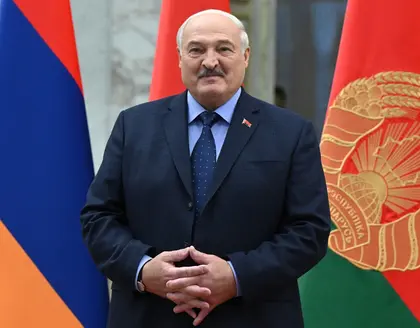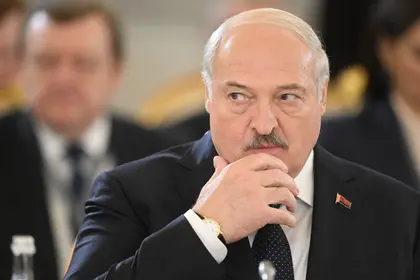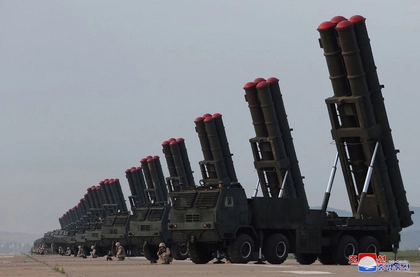On Sunday, January 26, the first round of the presidential elections will take place in Belarus, essentially the announcement of a result predetermined by dictator Alexander Lukashenko. This is the second part of an interview with Pavel Latushko, head of the National Anti-Crisis Management, deputy to Sviatlana Tsikhanouskaya in the United Transitional Cabinet, and former Minister of Culture, who was sentenced in absentia to 18 years in prison by the Belarusian regime in March 2023. Part 1 can be read here.
Michał Kujawski: I have a personal question for you. You live in Warsaw, Poland. What is your most recent memory related to Belarus? What do you remember?
JOIN US ON TELEGRAM
Follow our coverage of the war on the @Kyivpost_official.
Pavel Latushko: I wasn’t expecting this question. I often dream of Belarus. It’s a good sign; I’m an optimist. Among my memories is my home, which is located near Minsk. It stands empty, it’s been “seized.” That hurts. It’s in a village where my great-grandparents and grandparents were born and lived. Another memory is the car ride I took with the Polish ambassador from the Lithuanian embassy in Minsk to Białystok in Poland. If the ambassadors of Poland and Lithuania hadn’t convinced me to leave – and I resisted for a long time – I might not be alive today.

Davos Power Hour: Zelensky’s High-Stakes Talks for Ukraine
MK: Approximately 140,000 Belarusians living in Poland. I have many friends among them who also took part in the protests, and their connection to Belarus is strong. Yet they face many challenges here. One of them, for instance, is the lack of consular services and the issuance of passports. You propose issuing “opposition” passports. What does that entail?
PL: The situation is extraordinary; it’s not just about an “opposition” passport but about an institution that could take on this task. Recently, I spoke in Vilnius with Lithuania’s new Minister of Justice. I told him that we are not the opposition; we are the majority. We have managed to create unprecedented institutions. We have a president-elect in exile, Sviatlana Tsikhanouskaya, a transitional cabinet, and an elected Coordination Council. These institutions can issue documents.
Of course, issuing a passport for the new Belarus is a challenging task. We have already designed its template. However, the difficult issue remains the recognition of this passport by other countries. This is also part of the strategy for our Western partners to support us. I cannot say yet whether it will succeed, but we are working on achieving international recognition. The legalization of the residency of Belarusians in Western countries whose documents are expiring is a significant issue. By halting consular services, Lukashenko has sent a clear signal that those who have left Belarus are unwanted. His attitude toward Belarusians shows the kind of person he is, if he can even be called a person.
MK: Stopping at the issue of Belarusians in Poland and other Western countries, there is a significant problem with the rehabilitation and legalization of Belarusian veterans who fought in the war on the Ukrainian side. How is this matter progressing?
PL: We address this topic at each of our meetings with the Ministry of Internal Affairs of Poland and with the authorities of Lithuania. The decisions belong to the host countries, and they are also influenced by intelligence services. Each country looks at this issue from the perspective of its own security. We appeal to the authorities of the countries where Belarusians who fought for the freedom of Ukraine and Belarus are located, asking them to extend a helping hand to them. They risked their lives and health. Over 70 people have died. Recently, Maria Zaitseva, a 24-year-old Belarusian volunteer soldier fighting for Ukraine, was killed. She was also active during the protests in Belarus.
Lukashenko is a liar. We also know that he encouraged Putin to start this war.
MK: Recently, in one of his interviews, President Zelensky said that Lukashenko called him with an apology shortly after the invasion began in 2022. Lukashenko, in response, accused the Ukrainian president of lying. What is going on here, what kind of game is this?
PL: I would like to shake the hand of the President of Ukraine for what he said. I am sure it is true. Zelensky posed the question of whether Lukashenko has any legitimacy if he wants to call himself the president of the country. If he claims that it was not him, but Putin, who made the decision, then it appears that on Feb. 24, 2022, he learned about the invasion from Belarus on TV, and his generals were on vacation.
Lukashenko is a liar. We also know that he encouraged Putin to start this war. He did this to avoid a change in power. In 2020-21, Lukashenko announced that he would not seek re-election. According to him, the war was supposed to distract Putin and protect him in this way.
That’s not all – Lukashenko proposed to the President of Ukraine a retaliatory attack on the refinery in Mozyr, where 105,000 Belarusians live. The refinery employs 5,000 Belarusians. This shows that the lives and well-being of Belarusians mean nothing to him. He did this only to have an excuse to explain why the aggression started from Belarusian territory and to justify sending Belarusian troops to Ukraine. That is when he made this decision. President Zelensky once again revealed Lukashenko’s true face.
MK: Could Lukashenko have been scared that the military, the rank-and-file soldiers, would refuse to obey the order to attack?
PL: I disagree with many analysts who claim that it was thanks to Lukashenko that the Belarusian army was not sent to Ukraine. They were not sent because of the Belarusian people, who, unlike the Russians, took to the streets on Feb. 24, 2022; 1,700 people were arrested, many of them are still in prison. They received sentences of 25 years.
Why are the judges who sentenced them not on the sanctions lists? The Belarusian resistance tried to disrupt military logistics and trains. Lukashenko didn’t decide to send troops, not out of sympathy for Ukraine, but out of fear of protests and losing power.
According to our knowledge, Putin wants Belarus to stay out of the war physically. He gave Lukashenko the important task of producing weapons for Russia and bypassing sanctions through Belarus.
MK: In recent months, we regularly hear about more political prisoners pardoned by Lukashenko, but the overall number of imprisoned people is not decreasing – he’s simply arresting others. Recently, the dictator said that Poland had given up the fight for the imprisoned Andrzej Poczobut [a Belarusian political prisoner of Polish descent], to which the spokesperson of the Polish Ministry of Foreign Affairs responded that the regime should simply release the innocent man. What’s behind Lukashenko’s game?
PL: I agree with the spokesperson. These people are innocent. How can you pardon someone who is innocent? Lukashenko releases mainly those whose prison sentences are about to end. Leaving prison does not mean freedom – these people have to report to the militia every day, register, face difficulties finding work, or traveling abroad. They remain under the regime’s control. In their place, he imprisons more people.
We will fight until Lukashenko himself ends up in such a cage, accused of committing crimes against humanity.
MK: What is he doing this for?
PL: He wants to show the Belarusians before the elections that he is willing to make concessions and to release, for humanitarian reasons, those who opposed him. The second goal is to send signals to the West, but the West is not reacting. Maybe they would react if all political prisoners were released.
When Lukashenko publicly showed Viktar Babaryka, the former presidential candidate, one of the independent Belarusian newspapers wrote that it was a selfie of Raman Pratasevich [the former opposition figure, co-founder of NEXTA, now a regime propagandist, who visited Viktar Babaryka in prison] against the backdrop of torture. I would add that Lukashenko is setting up a human zoo. He is showing people in cages publicly. People with whom there was no contact for years while they were imprisoned.
Should we thank him for that? Applaud? He wants us to admit that by opposing him in 2020, we made a mistake. He would like us to recognize him as president. We will fight until Lukashenko himself ends up in such a cage, accused of committing crimes against humanity.
MK: Lithuania submitted a request against Lukashenko to the Hague Tribunal in 2024.
PL: No country has supported this request, which raises our concern. It is difficult for Belarusians to understand why only one country has taken the initiative to submit a request for an arrest warrant for Lukashenko for committing crimes against humanity. I also hope that the Ukrainian authorities, now that they have become a member of the ICC on Jan. 1, 2025, will support our efforts regarding the issuance of an arrest warrant for Lukashenko for the deportation of Ukrainian children and their indoctrination in Belarus. We have evidence of this. Lukashenko should also be punished for complicity in the aggression against Ukraine. He cannot avoid responsibility.
MK: Why haven’t other countries, such as Poland, done this?
PL: I can only speculate that they are keeping this as a weapon they might use in the future if Lukashenko goes further. But that’s just my guess.
Lukashenko has been committing crimes for years, and this situation is a test for the West, whose leaders are eager to take pictures with us, but when it’s time to act, they just watch. If the West doesn’t act, Belarusians will lose faith in democracy as an effective tool for governing the country. Values and human rights are the foundation of the EU. If Belarusians see that these are just words and not actions, why should they fight? I ask this question to our Western partners. I would like them to answer me, as a Belarusian sentenced to 18 years, someone they have attempted to kill multiple times. I would like our partners to tell all those sitting in Belarusian prisons what we are fighting for.
MK: Belarusians in Western countries are not just refugees and economic migrants, but also members of the regime’s services. Not long ago, in Warsaw, Professor Jan Malicki, head of the East European Studies Department at the University of Warsaw, was attacked. The perpetrators have not been identified yet, but there are suggestions that it might have been Belarusian services. We observe many acts of sabotage and hybrid actions. One of the Polish judges, as strange as it may sound, recently received “asylum” in Belarus. What are we dealing with?
PL: The services are always active, both in times of peace and during the ongoing war. The political will from Moscow and Minsk instructs them to act proactively. The goals vary. One of them is to destroy the Belarusian democratic forces in exile so that we no longer remain an alternative and a threat. Another goal is to provoke tensions in Western societies and weaken their support for Ukraine. Another task is sabotage and acts of sabotage, as Lukashenko has publicly stated.
You can also highlight the text and press Ctrl + Enter











